Are you new to the world of cryptocurrencies and eager to explore its possibilities? With a plethora of options available, it’s natural to feel overwhelmed. But fret not! We’ve curated a list of the top 5 cryptocurrencies tailored specifically for beginners venturing into the crypto space. Discover the world of cryptocurrencies for beginners: Learn the basics, tips, and strategies to navigate the exciting realm of digital assets.
#1 Cryptocurrencies for Beginners: Bitcoin (BTC):
Bitcoin, often hailed as digital gold, stands as the pioneer and most renowned cryptocurrency globally. Its enduring presence and widespread acceptance as a store of value make it an ideal starting point for beginners. The simplicity of its concept and easy accessibility through various investment platforms further enhance its appeal. Bitcoin is one of the best cryptocurrencies for beginners to invest in.
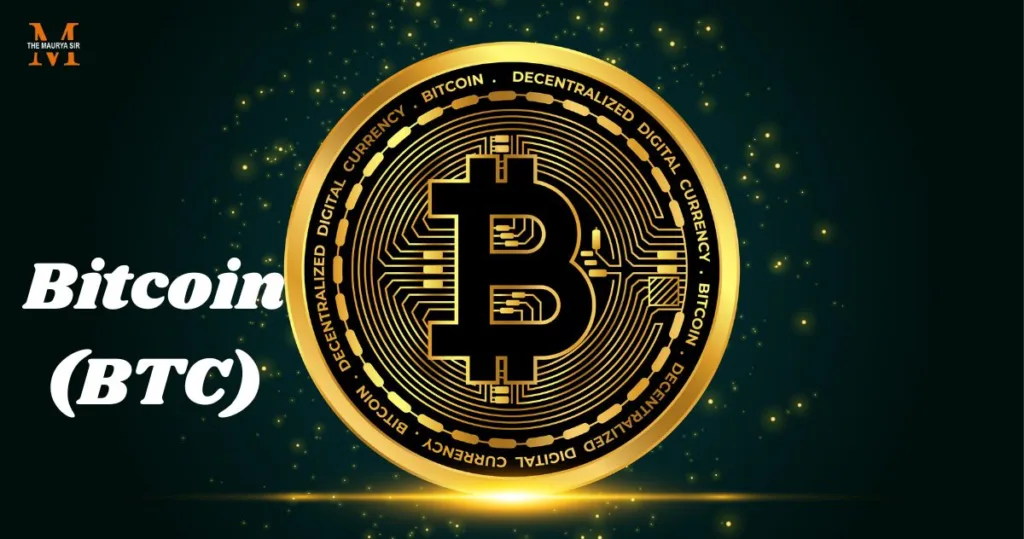
Pricing Detail:
- As of [Feb 16, 2024], the price of Bitcoin (BTC) is [52345.50] USD.
- Bitcoin’s price is subject to volatility and can fluctuate rapidly.
- Historical data shows Bitcoin’s price ranging from a few cents to its all-time high of over USD 60,000.
Market Value:
Trading volume – USD 1.02T
Revenue:
- Bitcoin generates revenue primarily through mining rewards and transaction fees.
- Miners receive rewards in the form of newly minted bitcoins for validating transactions and securing the network.
- Transaction fees are collected by miners for including transactions in blocks on the Bitcoin blockchain.
- Revenue from Bitcoin mining varies based on factors such as network difficulty, block rewards, and transaction volume.
Launch Date:
- Bitcoin was launched on January 3, 2009.
- It was created by an individual or group using the pseudonym Satoshi Nakamoto.
- The Bitcoin whitepaper titled “Bitcoin: A Peer-to-Peer Electronic Cash System” was published in October 2008.
- The first block, known as the “genesis block,” was mined by Satoshi Nakamoto, marking the official launch of the Bitcoin network.
Related Article: Top 10 Best Cryptocurrency Websites You Should to Know
Other Details:
- Bitcoin operates on a decentralized peer-to-peer network, eliminating the need for intermediaries like banks.
- The total supply of Bitcoin is capped at 21 million coins, making it a deflationary asset.
- Bitcoin transactions are recorded on a public ledger called the blockchain, which is maintained by a network of nodes.
- Bitcoin’s decentralized nature and fixed supply make it resistant to inflation and government manipulation.
- Bitcoin has gained widespread adoption as a digital currency and store of value, attracting both individual investors and institutional interest.
#2 Cryptocurrencies for Beginners: Ethereum (ETH):
Beyond merely a cryptocurrency, Ethereum represents a decentralized platform facilitating smart contracts and decentralized applications (DApps) devoid of downtime, fraud, or external interference. Ether (ETH), the native cryptocurrency of the Ethereum platform, fuels transactions and application operations. With Ethereum’s ongoing innovation and expansion, it offers promising investment prospects for beginners. This is also one of the best cryptocurrencies for beginners to invest in.
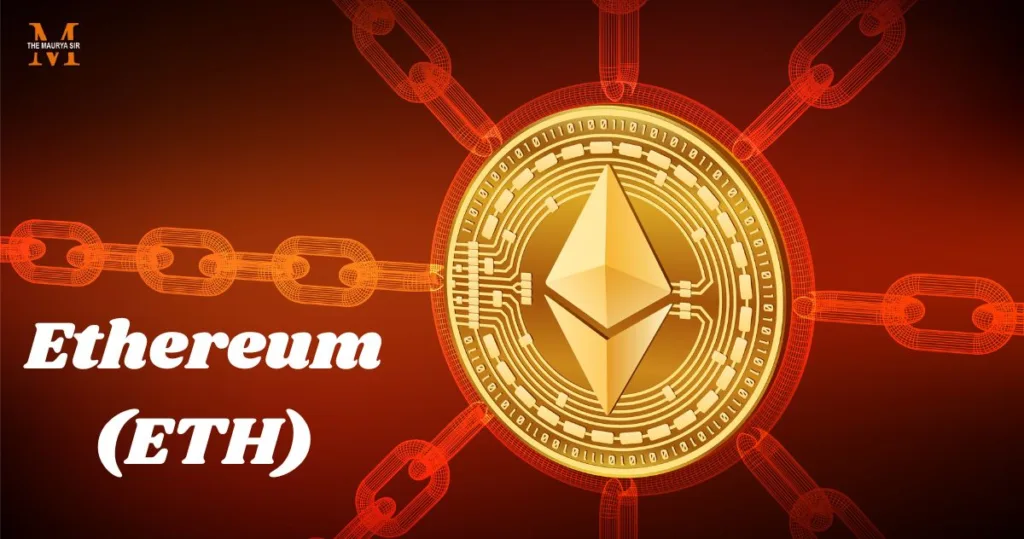
Pricing Detail:
- As of [16 Feb 2024], the price of Ethereum (ETH) is [2802.55] USD.
- Ethereum’s price is subject to market fluctuations influenced by factors such as demand, adoption, and technological developments.
- Ethereum’s price history shows significant volatility, with periods of rapid growth and price corrections.
Market Value:
Trading volume – USD 21860582793.91
Revenue:
- Ethereum generates revenue primarily through transaction fees and gas fees.
- Transaction fees are paid by users to prioritize and execute transactions on the Ethereum network.
- Users pay gas fees to compensate network validators for the computational resources required to process transactions and execute smart contracts.
- Revenue from transaction fees and gas fees contributes to the overall network security and incentivizes validators to maintain the Ethereum blockchain.
Launch Date:
- Ethereum was proposed by Vitalik Buterin in late 2013 and officially launched on July 30, 2015.
- The Ethereum network went live with its Genesis block, marking the beginning of its operation.
- The Ethereum Foundation oversaw the development and launch of Ethereum, with contributions from a diverse community of developers and contributors.
Other Details:
- Ethereum is a decentralized platform that enables the creation and execution of smart contracts and decentralized applications (DApps).
- Ether (ETH) is the native cryptocurrency of the Ethereum platform, used to pay for transaction fees and computational services on the network.
- Ethereum introduced the concept of smart contracts, which are self-executing contracts with predefined conditions written in code.
- Ethereum’s programmable blockchain allows developers to build a wide range of applications, including decentralized finance (DeFi), non-fungible tokens (NFTs), and decentralized exchanges (DEXs).
- Ethereum’s ongoing development includes upgrades such as Ethereum 2.0, which aims to improve scalability, security, and sustainability through the implementation of a Proof of Stake (PoS) consensus mechanism and sharding.
#3 Cryptocurrencies for Beginners: Binance Coin (BNB):
Cryptocurrencies for beginners: Binance Coin serves as the native cryptocurrency of Binance, one of the largest cryptocurrency exchanges globally. BNB boasts multiple utilities within the Binance ecosystem, including trading fee discounts and participation in token sales. Binance’s stellar reputation for security and user-friendly interface makes BNB an attractive option for novice investors delving into cryptocurrencies.
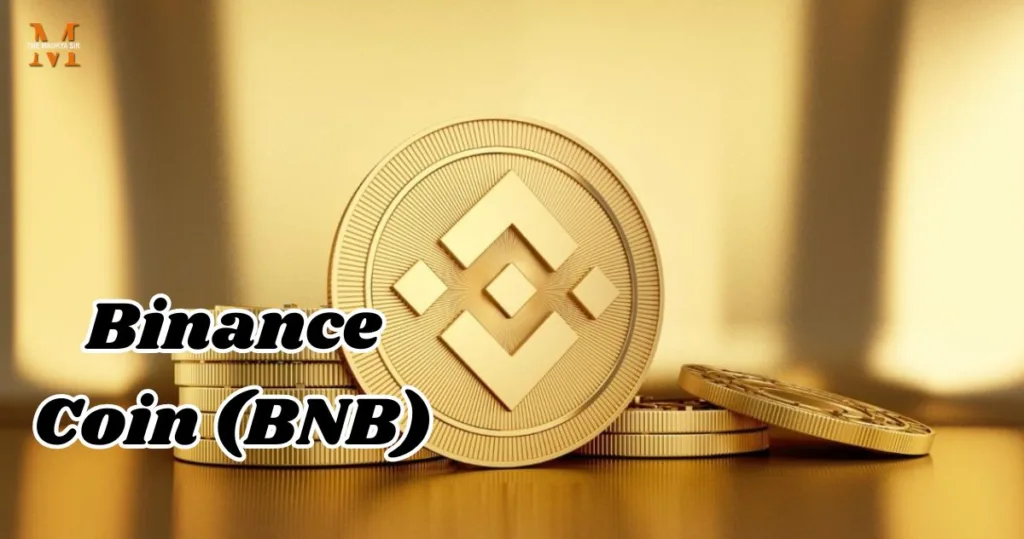
Pricing Detail:
- As of [16 Feb 2024], the price of Binance Coin (BNB) is [347.34] USD.
- Binance Coin’s price is subject to market fluctuations influenced by factors such as demand, trading volume, and Binance’s ecosystem developments.
- BNB’s price history exhibits both periods of rapid growth and price corrections, reflecting the dynamics of the cryptocurrency market.
Market Value:
Trading volume – USD 889.87M
Revenue:
- Binance Coin generates revenue primarily through its utility within the Binance ecosystem.
- Users can use BNB to pay trading fees on the Binance exchange, receiving discounts in return.
- BNB holders can participate in token sales and initial coin offerings (ICOs) hosted on the Binance Launchpad platform.
- The growth and activity within the Binance exchange and its associated services closely tie Binance Coin’s revenue.
Launch Date:
- Binance Coin (BNB) was launched through an initial coin offering (ICO) held by Binance on July 25, 2017.
- The ICO raised funds to support the development and expansion of the Binance exchange and its ecosystem.
- Binance Coin was initially issued as an ERC-20 token on the Ethereum blockchain before migrating to Binance’s native blockchain, Binance Chain, in April 2019.
Other Details:
- Binance Coin is the native cryptocurrency of the Binance exchange, one of the largest cryptocurrency exchanges globally.
- BNB serves various functions within the Binance ecosystem, including payment for trading fees, participation in token sales, and access to premium features.
- Binance Coin operates on Binance Chain, a blockchain platform developed by Binance to facilitate fast and low-cost transactions.
- BNB’s utility and adoption within the Binance ecosystem contribute to its value proposition and market demand.
- Binance regularly introduces new features and initiatives to enhance the utility and ecosystem of Binance Coin, driving its growth and adoption among users.
#4 Cryptocurrencies for Beginners: Cardano (ADA):
Cardano positions itself as a blockchain platform striving to deliver a secure and scalable infrastructure for decentralized applications and smart contracts. Its distinctive approach to scalability, interoperability, and sustainability has garnered attention from both investors and developers. With a robust team and an engaged community, Cardano presents an enticing opportunity for beginners (cryptocurrencies for beginners) seeking to diversify their cryptocurrency portfolio.
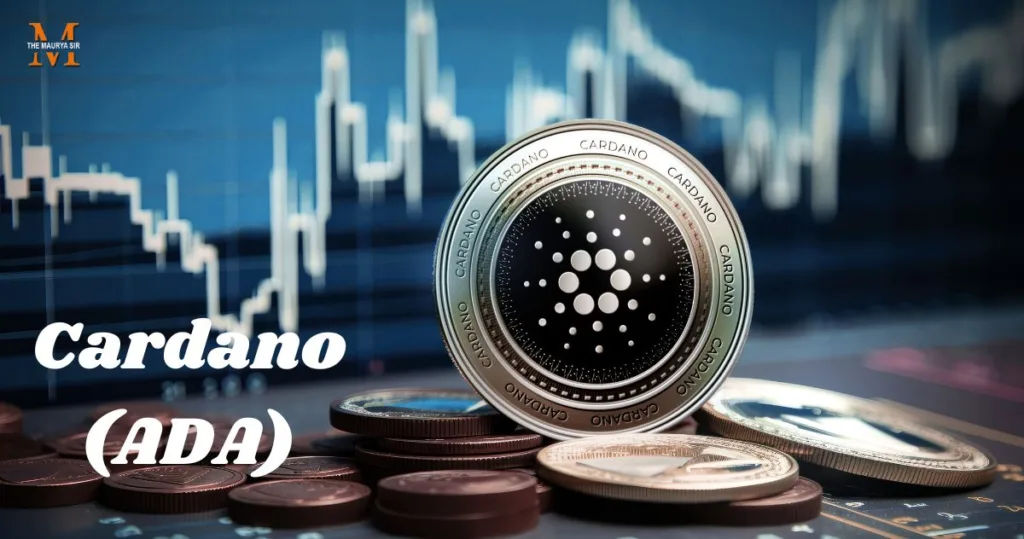
Pricing Detail:
- As of [16 Feb 2024], the price of Cardano (ADA) is [0.59] USD.
- Cardano’s price is subject to market dynamics influenced by factors such as demand, technological developments, and overall market sentiment.
- ADA’s price history reflects fluctuations typical of the cryptocurrency market, with periods of growth, consolidation, and correction.
Market Value:
Trading volume – USD 602,624,080
Revenue:
- Cardano does not generate revenue in the traditional sense, as it is a decentralized blockchain platform.
- However, stakeholders in the Cardano ecosystem, such as developers and validators, may earn rewards through staking and participating in the network’s governance.
- Staking involves delegating ADA tokens to a stake pool to help secure the network and earn rewards in return.
- Revenue from staking rewards incentivizes stakeholders to actively participate in the network’s maintenance and governance, contributing to its decentralization and security.
Launch Date:
- Cardano’s development began in 2015, led by Input Output Hong Kong (IOHK) and its founder, Charles Hoskinson.
- The Cardano main net was officially launched on September 29, 2017, with the release of its first phase, Byron.
- Since then, Cardano has undergone several protocol upgrades and development phases, including Shelley, Goguen, and ongoing efforts towards decentralization and scalability.
Other Details:
- Cardano’s design provides a secure and scalable infrastructure for developing decentralized applications (DApps) and smart contracts on the blockchain platform.
- ADA is the native cryptocurrency of the Cardano platform, used for transactions, staking, and governance.
- Cardano aims to address scalability, interoperability, and sustainability challenges faced by existing blockchain networks through its innovative approach and research-driven development.
- Cardano guides its development based on scientific philosophy and peer-reviewed research, emphasizing rigorous academic principles and formal methods.
- The Cardano ecosystem includes a diverse community of developers, researchers, and enthusiasts collaborating to build and advance the platform’s capabilities.
#5 Cryptocurrencies for Beginners: Solana (SOL):
Solana emerges as a high-performance blockchain platform aiming to facilitate rapid, secure, and scalable decentralized applications and crypto-native projects. Its cutting-edge technology enables it to process thousands of transactions per second, establishing itself as one of the fastest-growing ecosystems in the crypto realm. As Solana gains momentum and attracts developers, investing in SOL could yield significant potential for beginners capitalizing on emerging trends in the cryptocurrency market.
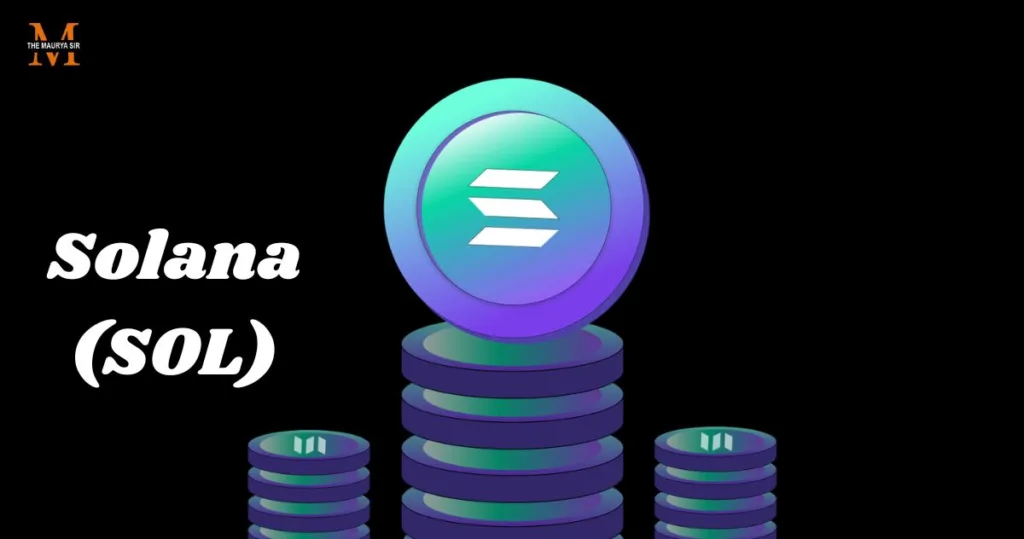
Pricing Detail:
- As of [16 Feb 2024], the price of Solana (SOL) is [116.64] USD.
- Solana’s price is subject to market fluctuations influenced by factors such as demand, network activity, and overall cryptocurrency market trends.
- SOL’s price history exhibits periods of rapid growth, consolidation, and price corrections characteristic of the cryptocurrency market.
Revenue:
- Solana does not generate revenue in the traditional sense, as it is a decentralized blockchain platform.
- However, validators and participants in the Solana network may earn rewards through staking and participating in-network consensus mechanisms.
- Staking involves delegating SOL tokens to a validator node to help secure the network and earn rewards in return.
- Revenue from staking rewards incentivizes network participants to actively contribute to the security and decentralization of the Solana blockchain.
Market Value:
Trading volume – USD 2,355,270,628
Launch Date:
- Solana’s development began in 2017, led by Solana Labs and its founder, Anatoly Yakovenko.
- The Solana main net was officially launched on March 20, 2020, marking the public release of its blockchain protocol.
- Since its launch, Solana has focused on delivering high performance, scalability, and low transaction costs, positioning itself as a leading blockchain platform for decentralized applications (DApps) and crypto-native projects.
Other Details:
- Solana designs a high-performance blockchain platform to support fast, secure, and scalable decentralized applications and crypto-native projects.
- SOL is the native cryptocurrency of the Solana platform, used for transactions, staking, and governance.
- Solana distinguishes itself with its innovative consensus mechanism called Proof of History (PoH), which enhances transaction throughput and network scalability.
- Solana’s architecture incorporates a unique combination of technologies, including a permissionless network, parallel processing, and efficient data structure, enabling it to achieve high transaction throughput and low latency.
- Solana’s ecosystem includes a growing community of developers, entrepreneurs, and projects leveraging its blockchain infrastructure to build innovative solutions across various industries.
In conclusion, while venturing into cryptocurrency investments entails inherent risks, the top 5 cryptocurrencies outlined above offer sturdy fundamentals and growth potential for beginners. Remember to conduct thorough research, diversify your portfolio, and invest only what you can afford to lose. Here’s to your successful journey into the world of cryptocurrency investing!



